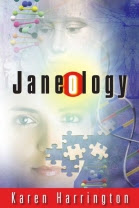To me, these interactions are the common denominator of the human race. So I was struck with a new revelation on my way home from a funeral yesterday. I realized someone else gets to put an end to your story.
In novels, it's called the epilogue. In life, the eulogy.
As I drove home from the service, I reflected on all the stories I had just heard about the deceased. She was the beloved mother of one of my writing mentors. Naturally, he imbued his recollections about his mother with a few great stories. One included her penchant for IHOP and how she demanded to stop and eat there one day after getting a biopsy. Said biopsy was still in its sealed medical jar and was supposed to be en route to the hospital via the patient. But on this day, my friend's mother insisted she had time for a quick Rooty-Tooty-Fresh-And-Fruity before couriering her biopsy to the hospital. So there it sat, on the table at IHOP inside a McDonald's sack my friend thankfully found in his car. He said he watched it with the care of Top Secret documents while she enjoyed her pancakes.
Another story about this woman came from one of her granddaughters who spoke lovingly about her grandmothers' famous stories. She told us that all of her siblings had a "Help Me" code to flash to one another when grandma's story was taking too long. The non-grandma engaged sibling would vanish to another room and call the other sibs cell phone, necessitating her ability to take leave from grandma without insulting her.
And the stories went on. Some were touching. Others were funny. All filled with respect and admiration for a woman who lived and loved. Still, I had to wonder if this feisty, well-loved woman would have told her stories just the same way.
Perhaps we should be mindful of how we might like our final epilogue to read. That is, while we still have a chance to influence the person who will later recount it to others in the form of a eulogy.
Because as someone once wrote, "When we die we become 'stories' in the minds of other people."
From Kunati Books, Spring 2008


No comments:
Post a Comment